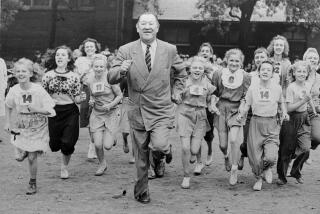Suspended Polish Marathoner Gets the Runaround
- Share via
The International Amateur Athletic Federation, which governs track and field, has recently revised its rules on drug use.
Under the old rules, track athletes testing positive for anabolic steroids were given a lifetime ban that was customarily reduced to an 18-month suspension after appeal.
But the IAAF announced in August of 1987 that it had instituted a tougher policy, resulting in 2-year suspensions for first-time users and lifetime bans for subsequent use.
Apparently, not everyone got the word.
Antoni Niemczak of Poland finished second in the 1986 New York Marathon. A drug test after the race showed traces of an anabolic steroid. Niemczak was suspended.
But for how long? After he had sat out 17 months of what he believed was an 18-month suspension, Niemczak said, he was informed that the suspension would not end for 6 more months, effectively excluding him from the Seoul Olympics.
Niemczak was understandably confused. In his case, the IAAF enforced its new sanction a year before it formally announced the rule change.
Niemczak was one of a few athletes to have been caught in the switches. His case exemplifies the apparent confusion about IAAF suspensions and appeals.
After missing the 1984 Summer Olympics because of the Soviet Bloc boycott, Niemczak went into training for the Seoul Games. As his country’s best marathon runner, Niemczak, 33, expected to be named to Poland’s 1988 Olympic team.
Although officials agree that Niemczak was administered the steroid to help reduce pain after a dental surgery and not to enhance performance, the runner has been unable to overturn the 2-year suspension, and equally unable to understand why it was not an 18-month set-down.
Niemczak said that when he was summoned to Warsaw April 21 to be told of the extended suspension, Polish officials said they did not know the reason for the extension.
“I went home and wrote in my training book, ‘Bye Olympic Games,’ ” Niemczak said. “Many times since, at night, I was thinking, why, why. My federation always told me there would be no problems--until April.”
Mike Gee, the IAAF’s administrator of doping control, said it was decided in August of 1986, 2 months before Niemczak ran in New York, that any serious doping cases would be considered under the new rules, although the policy was not made public then. Gee said that although the new drug rule was not announced, Niemczak’s violation occurred during the period when the rule was being applied.
“There was confusion over the length of the suspension,” Gee said from his London office. Gee said it was the Polish athletics federation’s responsibility to inform its athlete of the length of suspension. When contacted in Warsaw, federation officials did not respond to questions regarding the case’s details because of language difficulties.
However, Niemczak insists that he wasn’t informed early on and said he planned to run a marathon in May or June to show Polish officials he was ready for Seoul.
“The IAAF killed me,” Niemczak said from Boulder, Colo., where he has been training since September. “They killed my (chances of a) gold medal. Sometimes afterward, I would cry, but now it is OK. I have other dreams in running.”
His main one is competing in this fall’s New York City Marathon, where his troubles began 2 years ago. He called the race “my Olympics.”
Fred Lebow, New York race director, confirmed that Niemczak will enter the November race, scheduled a few days after the marathon runner’s suspension will formally end.
Niemczak, maintaining his innocence since reports of his positive test became known, has tried to appeal to the IAAF. His dentist sent a detailed account of the surgery and an explanation of the drug involved.
Said Gee: “We don’t deal with the individual athlete, we deal with the federation.”
It is unclear whether the Polish federation appealed on Niemczak’s behalf.
Gee admitted that for Niemczak the inflexibility of IAAF rules is unfortunate. “I personally think that we all have accepted the fact that the lad is innocent,” Gee said. “Unfortunately for him, our rules do not have mitigation in them. I’m afraid it is black or white.”
More to Read
Go beyond the scoreboard
Get the latest on L.A.'s teams in the daily Sports Report newsletter.
You may occasionally receive promotional content from the Los Angeles Times.






